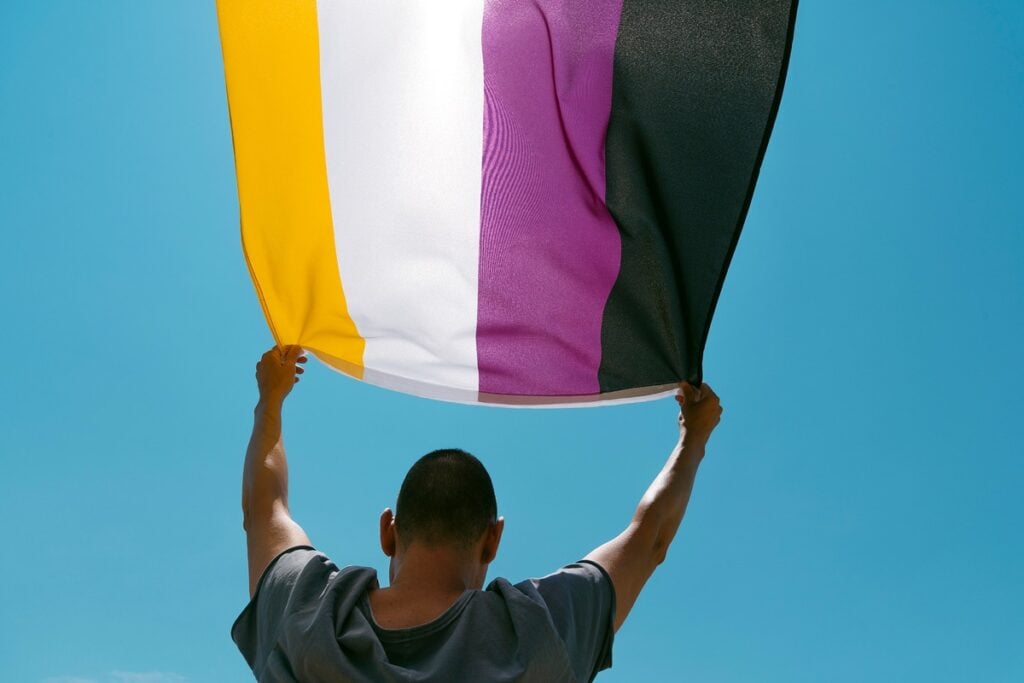Planning a funeral or attending a memorial service for a non-binary person may call for a few unique considerations. Honoring their identity and life authentically helps create a meaningful, respectful event that aligns with who they were. Here’s a guide to help ensure their individuality is honored in the arrangements and ceremony.
Understanding the Deceased Person’s Wishes
When planning any funeral, it’s crucial to consider the person’s preferences, and this becomes even more important when honoring a non-binary identity. Some non-binary individuals may leave specific instructions for their name, pronouns, attire, and how they want to be remembered. If they haven’t left instructions, it may be helpful to speak with their close friends or chosen family who understand the person’s wishes and values.
In all communications, use inclusive language that honors their identity. For example, avoid assuming gendered roles or titles. If they preferred gender-neutral pronouns, use those in announcements, programs, and eulogies. Being consistent with their preferred name and pronouns, even if family members are less familiar with them, can be a powerful act of respect.
Planning Inclusive Service Elements
For a truly personalized memorial, consider service elements that reflect the non-binary person’s personality and values. Here are some suggestions for meaningful touches that honor their identity:
- Personalized Ceremony Details: If they had interests or symbols that represented them, incorporate these into the service. Non-traditional colors, decor, or readings that align with their personality can add a thoughtful, authentic touch.
- Non-Gendered Language: In the eulogy, on the service program, and throughout the event, avoid traditional gender-specific language. For instance, terms like “child” instead of “son/daughter” or “sibling” instead of “brother/sister” can be more appropriate if these resonate with the individual’s identity.
- Memorial Display and Tributes: Photo montages, memory boards, or digital displays are meaningful ways to tell the person’s story without being restricted by conventional gender expectations. Opt for inclusive and varied images or captions that represent their identity and the diversity of their life experiences.
Dress Code and Attire for Attendees
Some non-binary individuals may want their memorial to reflect freedom from traditional gender norms, including in how attendees dress. While black attire is common at funerals, the individual may have preferred something different—perhaps a celebration of life in a favorite color or with attire that’s more relaxed and unique to their style.
Encouraging guests to wear neutral or specific colors, patterns, or themes can add a layer of personalization to the event. Include a note in invitations if there are dress preferences, inviting attendees to participate in a way that reflects the person’s style and spirit.
Including Chosen Family and Support Networks
For many non-binary individuals, chosen family and close friends play a pivotal role in their lives, often taking the place of traditional family roles. Recognizing these relationships in the funeral service can create a meaningful tribute to the person’s support network.
Consider including close friends or chosen family members as speakers, pallbearers, or ushers if they were significant in the person’s life. This can mean rethinking traditional family roles and, in some cases, may involve sensitive conversations with biological family members about why this choice matters in honoring the deceased’s identity.
Special Considerations for Religious or Cultural Funerals
If the service is in a religious or cultural context, it may require careful balance between the practices of the faith or culture and respect for the non-binary individual’s identity. In some settings, certain traditions may have gendered elements, which can pose challenges in honoring the deceased’s identity authentically.
In these cases, working with a sympathetic religious leader or cultural guide can help bridge the gap. It may be possible to adapt certain rites to avoid overt gendering or find alternative ways to honor the person. Open conversations with the family and religious or cultural leaders can lead to respectful compromises that acknowledge both the person’s identity and the family’s cultural or religious values.
Avoiding Common Missteps
In moments of grief, unintentional mistakes can happen, especially with sensitive matters like pronouns or names. Make an effort to use the correct pronouns, and gently correct others if they slip up. Showing respect for their identity and correcting missteps gracefully demonstrates your care for the individual and their memory.
Avoiding assumptions based on appearances or prior relationships can also make the service feel inclusive. Whether a close family member or a distant acquaintance, treating everyone with kindness and understanding, even in moments of correction, fosters a more supportive and respectful environment.
Additional Resources and Support for Non-Binary Inclusivity
LGBTQ+ organizations and resources can be valuable for those navigating non-binary funeral planning. Some organizations offer guidance and materials on planning inclusive services, and they can provide grief support that’s sensitive to non-binary identities. Additionally, family members who are less familiar with non-binary identities may benefit from speaking with these support groups to better understand how to honor their loved one’s wishes.
Here are some LGBTQ+ organizations and resources that provide support and guidance for planning inclusive, non-binary-sensitive funeral services and grief support:
Canada
- Egale Canada – Offers educational resources and guidance on LGBTQ+ inclusivity, including cultural competency training for funeral service providers. Egale Canada
- PFLAG Canada – Provides support groups and resources for families, with chapters across Canada that can help individuals better understand non-binary identities. PFLAG Canada
- The 519 (Toronto) – Offers LGBTQ+ community programs, including counseling and support services for families dealing with loss. The 519
United States
- GLAAD – Offers media resources and guidance on inclusive language, which can be helpful when preparing eulogies, obituaries, and announcements. GLAAD
- The Trevor Project – Provides support for LGBTQ+ individuals and has resources for families, including articles on understanding gender identity. The Trevor Project
- SAGE (Services & Advocacy for LGBT Elders) – Offers support for older LGBTQ+ adults and their families, including grief resources. SAGE USA
United Kingdom
- Stonewall UK – Provides resources on inclusive practices and offers training that can help with planning respectful services for LGBTQ+ individuals. Stonewall UK
- MindOut – An LGBTQ+ mental health service offering support for individuals experiencing grief and for family members in understanding non-binary identities. MindOut
- Switchboard LGBT+ Helpline – Offers phone and online support for individuals and families needing guidance on gender identity and inclusivity. Switchboard LGBT+
Australia
- Minus18 – Provides resources for understanding gender diversity and offers support for LGBTQ+ young people and their families. Minus18
- QLife – A national service offering counseling and support for LGBTQ+ individuals and families, available online and by phone. QLife
- Thorne Harbour Health – Offers health and community support services for LGBTQ+ individuals, including grief counseling and family resources. Thorne Harbour Health
These organizations can be helpful resources in navigating the unique needs and considerations of a non-binary person’s funeral, from providing cultural competency resources to offering grief support for family members.
Questions?
Do you have questions about this or any other aspect of the funeral industry? Send us a question and our experts will do their best to help you. Click here.

